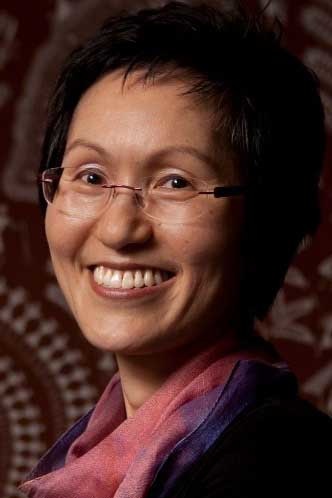Have you watched the Netflix series Squid Game? What about Parasite, the Academy’s Best Picture of 2019? For many Americans, pop culture is their first, and maybe only, exposure to Korean culture.

Hyaeweol Choi, a professor of Korean studies, gender history, and religious studies at the University of Iowa, wants to change that. Choi helped create the Korean Studies Research Network (KoRN), an intellectual hub intended to expand the study and visibility of Korean history, society, and culture in the Midwest. The network is a partnership between the UI College of Liberal Arts and Sciences, International Programs, and the Korea Foundation.
Choi, the C. Maxwell and Elizabeth M. Stanley Family and Korea Foundation Chair in Korean Studies, came to Iowa in 2018 looking to promote Korean studies in general, but says there was a missing piece.
“I realized that there are Korea-related faculty members here, but we are all scattered in different departments. There is no central or intellectual hub that could serve as a platform toward advancing Korean studies,” says Choi. “I thought we might need an institutional base, and that’s when I came up with the Korean Studies Research Network.”
Choi invites any scholar or student interested in Korea-related topics to join the network. Those who are interested can fill out the form here.
The inaugural Korean Studies Research Network conference is being held on Nov. 5 and 6. You can register for the conference here.
The group’s goal is to deepen the awareness and knowledge of Korea by bringing together scholars and graduate students whose research touches on Korea-related topics. It also aims to serve as a virtual platform, facilitating collaborative and interdisciplinary research on Korea in the state of Iowa and throughout the Midwest.
“Korean studies as an interdisciplinary field includes history, literature, gender studies, anthropology, sociology, religion, political science, language pedagogy, and communication, especially media and cinema studies because pop music and Korean films have been tremendously successful globally,” says Choi. “Part of the reason students come to Korean studies is because of Korean pop culture icons.”
Former UI sociology student Ji Hye Kim, who presented her paper at the KoRN seminar series and is now a postdoctoral fellow in Korean studies at the University of Pennsylvania, says the pop culture explosion has resulted in more students interested in Korean studies.
“The distinctive social and cultural contexts make Korea an intriguing research site more than ever before,” says Kim. “Growing popularity in Korean popular music, movies, and drama draws attention from students and scholars.”
Choi says Korean studies is deserving of more attention, given its rapid expansion over the last few decades.
“Thirty or 40 years ago, when people thought of Asian studies, they typically thought of China or Japan only,” says Choi. “But in the past couple of decades, Korean studies has become much more prominent.”
Russ Ganim, dean of international programs at Iowa, attributes the boom in Korean studies and pop culture to an effort toward worldwide exposure.
“Korean culture has grown dramatically,” says Ganim. “The Korean government has funded a lot of projects, resulting in movies like Parasite and shows like Squid Game. The Korean government has been working with people in the arts, education, and other industries to promote Korean culture worldwide.”
When Ganim took over as director of the Division of World Languages, Literatures, and Cultures in 2011, he wanted to develop a Korean program to keep up with the efforts being made overseas.
And when Choi joined the UI faculty in 2018, she was awarded a major grant from International Programs as seed money to start KoRN a year later.
With a distinguished record of scholarship, Choi has been playing a leadership role in the fields of Korean, Asian, and gender studies globally. She came to Iowa after eight years in Australia working as Australian National University’s Korea Foundation Chair Professor of Korean Studies and the director of the Korea Institute at the university. While in Australia, she served as the president of the Korean Studies Association of Australasia. Prior to that, she built and expanded the Korean studies program in the School of International Letters and Cultures at Arizona State University.
Choi’s last two academic positions have been funded, at least in part, by the Korea Foundation, a nonprofit organization founded in 1991 that helps promote Korea around the world.
“I approached the Korea Foundation about KoRN in 2019, and they were very open to our plan,” says Choi. “I got the grant from the Korea Foundation this year.”
With support from the foundation, the network began to offer resources to Korean studies students and researchers in the form of a dissertation workshop, a public lecture series, and the inaugural conference. In addition to continuing these key activities, future plans include organizing book and article workshops, art exhibitions, and community outreach.
“This network showcases the work of graduate and professional students,” says Ganim. “We have a significant population of students at the graduate and professional level who need a resource like this to present research.”
The network will host an inaugural conference Nov. 5–6. The virtual conference will include scholars from around the Midwest. The keynote speaker will be David C. Kang, professor of international relations and business at University of Southern California, who will speak about North Korea and its nuclear program. This year’s KoRN conference will be held virtually, but Choi hopes the conference will become an in-person event in the future.
“I want to bring in ideas and inform the public about important issues facing Korea and what experts really think,” says Choi. “It’s not just exclusive to Korean studies. I consider this network as a way to advance interdisciplinary and border-crossing scholarship and to stimulate diverse ways of engagement with the public.”